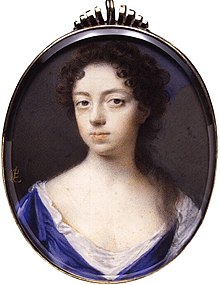Analysis of Life's Progress
Anne Kingsmill Finch 1661 – 1720 (Westminster)
How gayly is at first begun
Our Life's uncertain Race!
Whilst yet that sprightly Morning Sun,
With which we just set out to run
Enlightens all the Place.
How smiling the World's Prospect lies
How tempting to go through !
Not Canaan to the Prophet's Eyes,
From Pisgah with a sweet Surprize,
Did more inviting shew.
How promising's the Book of Fate,
Till thoroughly understood!
Whilst partial Hopes such Lots create,
As may the youthful Fancy treat
With all that's Great and Good.
How soft the first Ideas prove,
Which wander through our Minds!
How full the Joys, how free the Love,
Which do's that early Season move;
As Flow'rs the Western Winds!
Our Sighs are then but Vernal Air;
But April–drops our Tears,
Which swiftly passing, all grows Fair,
Whilst Beauty compensates our Care,
And Youth each Vapour clears.
But oh! too soon, alas, we climb;
Scarce feeling we ascend
The gently rising Hill of Time,
From whence with Grief we see that Prime,
And all its Sweetness end.
The Die now cast, our Station known,
Fond Expectation past;
The Thorns, which former Days had sown,
To Crops of late Repentance grown,
Thro' which we toil at last.
Whilst ev'ry Care's a driving Harm,
That helps to bear us down;
Which faded Smiles no more can charm,
But ev'ry Tear's a Winter-Storm,
And ev'ry Look's a Frown.
Till with succeeding Ills opprest,
For Joys we hop'd to find;
By Age too, rumpl'd and undrest,
We gladly sinking down to rest,
Leave following Crouds behind.
| Scheme | ABAAB CDCBD EFEXF GXXGX HXHHX IJIIJ KLKKL MNMXN EOEXO |
|---|---|
| Poetic Form | |
| Metre | 1111101 1010101 11110101 11111111 010101 11001101 110111 1101011 111011 110101 110111 110001 11011101 11010101 111101 11010101 1101101 11011101 11110101 110101 101111101 1101101 11010111 11010101 01111 11110111 110101 01010111 11111111 011101 011110101 10101 01110111 11110101 111111 1110101 111111 11011111 1110101 01101 1101011 111111 1111001 11010111 1100101 |
| Closest metre | Iambic tetrameter |
| Characters | 1,483 |
| Words | 256 |
| Sentences | 15 |
| Stanzas | 9 |
| Stanza Lengths | 5, 5, 5, 5, 5, 5, 5, 5, 5 |
| Lines Amount | 45 |
| Letters per line (avg) | 25 |
| Words per line (avg) | 6 |
| Letters per stanza (avg) | 126 |
| Words per stanza (avg) | 28 |
Font size:
Submitted on May 13, 2011
Modified on March 05, 2023
- 1:21 min read
- 113 Views
Citation
Use the citation below to add this poem analysis to your bibliography:
Style:MLAChicagoAPA
"Life's Progress" Poetry.com. STANDS4 LLC, 2024. Web. 6 May 2024. <https://www.poetry.com/poem-analysis/3266/life%27s-progress>.


Discuss this Anne Kingsmill Finch poem analysis with the community:
Report Comment
We're doing our best to make sure our content is useful, accurate and safe.
If by any chance you spot an inappropriate comment while navigating through our website please use this form to let us know, and we'll take care of it shortly.
Attachment
You need to be logged in to favorite.
Log In